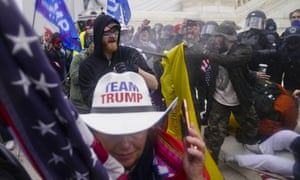Global group urges the Morrison government to be vigilant about the growth of far-right extremism here
The Morrison government has been urged to treat the deadly mob assault on the US Capitol as “a wake-up call”, with a leading human rights organisation saying Australian security agencies must counter the growth of rightwing extremism.
Human Rights Watch published its annual global report on human rights abuses on Wednesday evening, calling on US allies such as Australia to work with the incoming Joe Biden administration to “shore up a global defence of human rights”.
The Australian director at Human Rights Watch, Elaine Pearson, said Donald Trump’s role in inciting a mob assault on the Capitol last week was “a wake-up call for governments around the world including Australia”.
“The Australian government should speak plainly and consistently in condemning the actions of those who undermine democracy, even when it is the president of the United States,” she said.
Pearson said while the US should hold prompt and impartial investigations into the violence in Washington DC, Australian authorities also needed to be on guard.
“At the same time, Australian authorities should be vigilant about the growth of rightwing extremism here,” she said.
The comments follow increasing warnings from the domestic intelligence agency Asio about the “real and growing” threat posed by the far right in Australia – which now represents up to 40% of the domestic counter-terrorism caseload.
To date, the Australian government has refused to be drawn on Trump’s role in inciting his supporters who stormed the US Capitol building during the certification of the election results, even as a growing number of senior Republican figures in the US back impeachment proceedings against the outgoing president.
The prime minister, Scott Morrison, last week condemned the rioters for the “terribly distressing” violence and he called for a peaceful transfer of power to election winner Biden, without addressing Trump’s responsibility for undermining the election results or encouraging the mob.
The acting prime minister, Michael McCormack, subsequently described the events in the US as “unsavoury” and “unfortunate” but has faced criticism for likening the Capitol riots to the Black Lives Matter protests. On Tuesday, he invoked the phrase “all lives matter” – something described by critics as a dog-whistle to the far right.
The new report by Human Rights Watch accused Trump of four years of “indifference and often hostility to human rights”, during a period in which China and Russia “sought to undermine the global human rights system”.
Kenneth Roth, the group’s executive director, said Trump’s “flouting of human rights at home and his embrace of friendly autocrats abroad severely eroded US credibility abroad”.
The 761-page world report includes a chapter on Australia. The organisation contends that Australia’s global reputation on human rights “suffered from the government’s failure to address longstanding abuses against First Nations people”.
The report said at least seven Indigenous people died in custody in Australia last year.
Indigenous Australians are significantly overrepresented in the criminal justice system, the report added, “with Aboriginal and Torres Strait Islander people comprising 29% of Australia’s adult prison population, but just 3% of the national population”.
Human Rights Watch called for action to reduce Aboriginal and Torres Strait Islander incarceration rates, including repealing punitive bail laws and mandatory sentencing laws, decriminalising public drunkenness, ending overpolicing of Indigenous communities, and raising the age of criminal responsibility from 10 to at least 14.
“In 2020 the global Black Lives Matter movement refocused attention in Australia on systemic racism and inequality against First Nations people, particularly high death rates in custody, and overrepresentation in prisons,” Pearson said.
“Australian federal and state governments need to urgently prioritise reforming longstanding policies that discriminate against First Nations people.”
The report also pointed to Australia’s “punitive, cruel, and unlawful” policy of offshore processing of asylum seekers and criticised the Morrison government for not taking up New Zealand’s offers to take some of the 290 people remaining in Papua New Guinea and Nauru.
Pearson also said some police practices during Victoria’s Covid-19 lockdown threatened basic rights, while the federal government’s “punitive approach to international travel has left thousands of Australian families overseas and out of pocket, separated from their loved ones”.
Parliament’s joint committee on intelligence and security has begun an inquiry into far-right extremism in Australia, after the home affairs minister, Peter Dutton, bowed to pressure from Labor late last year to launch such an investigation.
However, Dutton drafted broader terms of reference to focus on “Islamist and far rightwing extremist groups” among others. He has previously said security agencies should pursue security threats whether by “rightwing lunatics or leftwing lunatics”.
The Australian terrorist who killed 51 Muslim worshipers at a mosque in Christchurch in 2019 was active in far-right groups in his home country but escaped the attention of authorities, according to the royal commission into the massacre.
The head of Asio, Mike Burgess, said in October that while Sunni Islamic extremism remained the agency’s greatest concern, “rightwing extremists are more organised, sophisticated, ideological and active than previous years”.
Burgess said many such groups and individuals had seized on Covid-19, seeing the pandemic “as proof of the failure of globalisation, multiculturalism and democracy, and confirmation that societal collapse and a ‘race war’ are inevitable”.
Burgess used an annual threat assessment last February to warn that small cells regularly met in Australian suburbs “to salute Nazi flags, inspect weapons, train in combat and share their hateful ideology”.

No comments:
Post a Comment